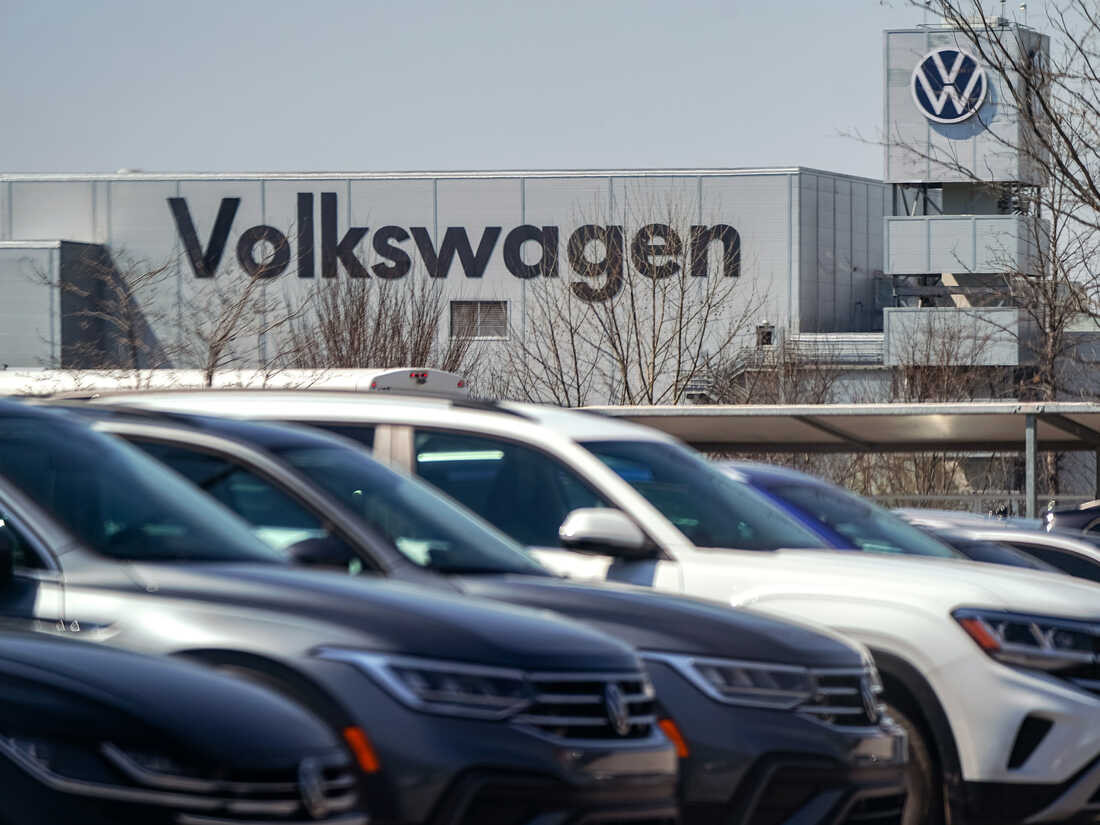Business
Voting ends in historic Tennessee Volkswagen union election
Volkswagens are seen in the employee parking lot at the Volkswagen automobile assembly plant on March 20, 2024 in Chattanooga, Tennessee.
Elijah Nouvelage/Getty Images
hide caption
toggle caption
Elijah Nouvelage/Getty Images
Volkswagens are seen in the employee parking lot at the Volkswagen automobile assembly plant on March 20, 2024 in Chattanooga, Tennessee.
Elijah Nouvelage/Getty Images
At the Volkswagen plant in Chattanooga, Tenn., three days of voting have wrapped up. Now, the counting of ballots begins.
Within hours, we should know whether workers have changed the course of labor history in the South by voting to join the United Auto Workers union — or whether they’ve dealt a major blow to the union by voting no in this first test of the UAW’s strength since last fall’s strike against the Big 3 automakers.
Some 4,300 hourly workers were eligible to vote this week. The union needs a simple majority of votes cast to win the election.
Kelcey Smith, who’s worked at Volkswagen for about a year, says he was voting yes in hopes that a union would lead to higher wages and more of a cushion for his children and grandchildren.
“If I’m going to give a company years and years of my life to make a product for them, to generate money for them, then I want all that I can get so I can have something for mines,” he says.
Chattanooga plant was previously a place of UAW defeat
All eyes are on the vote, especially because previous attempts by the UAW to unionize the same Chattanooga plant in 2014 and 2019 ended in defeat. Similar efforts at several other auto manufacturing plants in the South have also failed over the years.
One of the key reasons is that the jobs paid well compared to others in the region, and many workers haven’t felt the need for union representation. In fact, over the years, Southern states lured foreign automakers with not just hundreds of millions of dollars in incentives but some assurance that the companies wouldn’t have to deal with the UAW if they didn’t want to.
The pitch worked. In the last three decades or so, around a dozen foreign auto plants have opened up, from Nissan and Toyota to Honda and Mercedes, among others. Collectively, they’ve created tens of thousands of jobs for the Southern economy.
Politicians say well-paying jobs are in jeopardy
Republican leaders in the state have warned that those jobs could be lost should workers join the UAW.
“I believe it would be a big mistake for those workers to risk their future by giving up the freedom to decide it themselves and hand that over to a negotiator on their behalf,” said Tennessee Gov. Bill Lee on a visit to Chattanooga earlier this month.
The UAW’s focus on the South, backed by $40 million in spending, has drawn concern from other state politicians as well.
On Tuesday, Lee joined governors from Texas, South Carolina, Mississippi, Georgia and Alabama in a joint statement speaking out against the union drive.
“The reality is companies have a choice when it comes to where to invest and bring jobs and opportunity,” the statement said. “Unionization would certainly put our states’ jobs in jeopardy — in fact, in this year already, all of the UAW automakers have announced layoffs.”
Tesla, which is not unionized, also announced major layoffs this week.
It’s the only VW plant in the world without worker representation
In a Q&A on its website, Volkswagen wrote: “We respect our employees’ right to decide this important issue through a democratic process and to determine who should represent their interests.”
The Chattanooga plant produces Volkswagen’s Atlas SUV and the ID.4, an electric SUV. It is the only Volkswagen plant out of 120 plants worldwide without worker representation.
With the vote at Volkswagen now wrapped up, the union is turning its attention to the Mercedes-Benz plant in Vance, Ala., where a union election will begin May 13 for some 5,200 workers.
